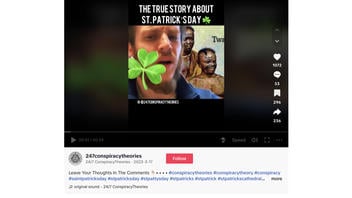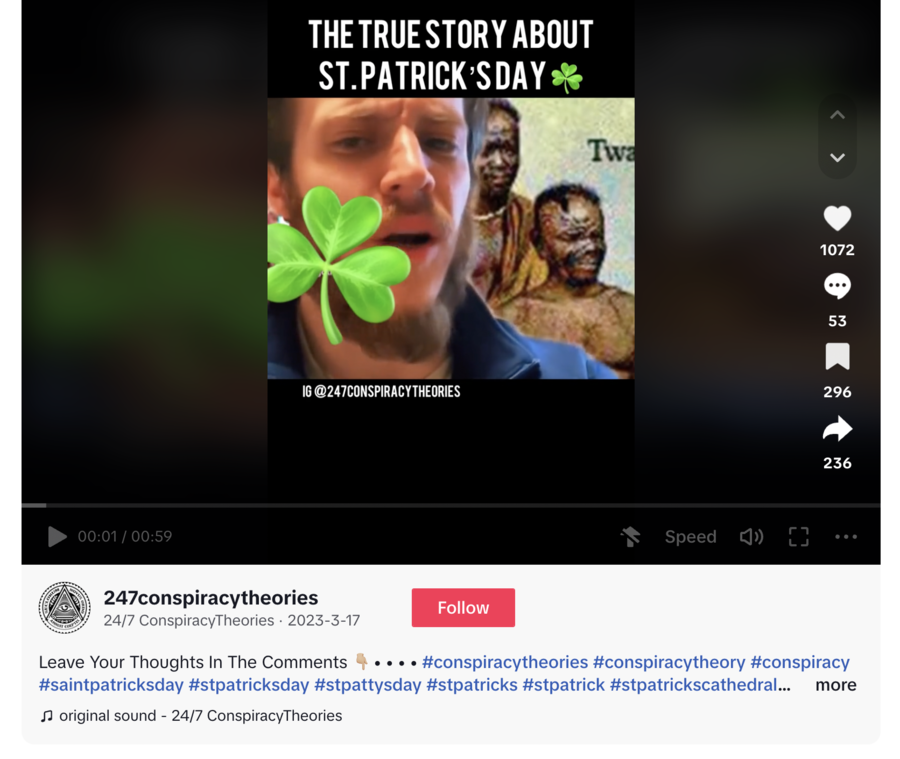
Were the Twa tribe the first people to live in modern-day Ireland? No, that's not true: Lead Stories found no evidence supporting this claim. An archeologist and professor of African history interviewed by Lead Stories was not aware of any facts pointing in that direction, either.
The claim reappeared in a post (archived here) on TikTok where it was published on March 17, 2024, under the title:
THE TRUE STORY ABOUT
ST. PATRICK'S DAY ☘️
The man in the video began:
Did you know that the Twa tribe was the first inhabitants of Ireland? And, allegedly, they were all killed by St. Patrick. They're referred to as Achaean by other African tribes or by Europeans -- leprechauns, meaning "small body". The average height of the Twa tribe, just five feet tall.
This is what it looked like on TikTok at the time of writing:
(Source: TikTok screenshot taken on Mon Mar 18 19:32:28 2024 UTC)
Twa (archived here) is a tribe in central Africa known for their small stature. In contrast, leprechauns (archived here), are fictional miniature creatures from Irish folklore (archived here), not real people.
Akin Ogundiran, Ph.D., who is the 2023-2025 president (archived here) of the Society of Africanist Archaeologists and a professor of African history (archived here) at Northwestern University, told Lead Stories via email on March 18, 2024:
I am not aware of any evidence that supports this claim.
Had there been a massacre of a genocidal scale referred to in the video on TikTok, there would have been archeological discoveries backing up this theory.
Studies based on the analysis of ancient DNA do not link the first people in Ireland to the Twa tribe, either, a 2020 BBC article (archived here) reads:
Ireland's Neolithic inhabitants traced their origins to an expansion of people out of Anatolia (modern Turkey) around 6,000-7,000 years ago. This migration transformed Europe's way of life from one focused on hunting to one based on agriculture. Genetically, Ireland's first farmers were most closely related to people living at broadly the same time in Iberia (modern Spain and Portugal). Over generations, the farmers traversed the Mediterranean from Anatolia to Iberia, weaving their way up the French coast before making their way to Ireland by sea. On reaching the shores of this North Atlantic landmass, the new migrants quickly displaced the local Mesolithic hunter-gatherers, who were genetically similar to pre-farming peoples across Europe.
St. Patrick (archived here), a national saint of Ireland credited for spreading Christianity there, lived much later, roughly 1550 years ago.
The man who made the claim on TikTok did not cite a single source, and the caption below the post overtly referred to its content as:
Previously, fact checking website Snopes found no evidence to support the claim. According to its 2019 article (archived here), the claim has been around at least since 1884. In today's world, it typically resurfaces on social media around St. Patrick's Day.
Other Lead Stories fact checks concerning international topics can be found here.

















